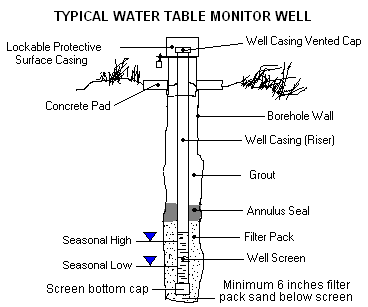Florida Geotechnical Engineering (FGE) provides wastewater land application management services to multiple sectors of our community including private industry, municipalities, and Counties. FGE will provide all the services you need to meet agency permitting requirements for all types of domestic effluent and industrial wastewater zones of discharge (ZOD).
With many years of ground water regulatory experience FGE licensed professionals will consult, represent, and guide you through every step of your ground water discharge permitting project. Our services include preliminary evaluation of your proposed ZOD, representing your interests and needs with local permitting agency, complete site-specific hydrogeological evaluation of your proposed ZOD, design and construction of your ground water monitoring plan, establish pre-discharge ZOD ground water quality, evaluation of long term ZOD performance, and expert representation through any ground water regulatory compliance issues. All our wastewater services are customized to meet your specific objectives in the most cost-effective approach possible, while following American Society for Testing and Materials and industry best practices to deliver a quality investigation you can rely on.
Preliminary Needs Evaluation
Not all situations involving the land application of reclaimed effluent or wastewater are required to have a permitted zone of discharge with ground water monitoring plans. Whether discharge methods are rapid rate such as percolation ponds, or slow rate sprayfields, agency permitting requirements addressing ground water concerns differ depending on:
- Type of Industry
- Chemical characterization of effluent
- Volume of effluent discharge
- Facility operational and permitting history
- Quality of the receiving aquifer
- Location relative to potable water supply wells and surface waters of the state
All of these factors need to be considered when evaluating permitting requirements for a discharge as regulated under Florida Administrative Code Chapters:
- 62-4, Permits
- 62-520, Ground Water Classes, Standards, and Exemptions
- 62-521, Wellhead Protection
- 62-610, Reuse of Reclaimed water and Land Application
- 62-620,Wastewater Facility and Activities Permitting
- 62-621, Generic Permits
- 62-660, Industrial Wastewater Facilities
- 62-670, Feedlot and Dairy Wastewater Treatment and Management Requirements
- 62-673, Phosphogypsum Management
Florida Geotechnical Engineering will analyze your effluent and wastewater reuse and/or disposal needs and guide you to the most cost effective plan of action for permitting.
Initial Site Evaluations
Though relatively flat, our state is predominantly underlain by very soluble limestone and dolostone, that over thousands of years of dissolution have caused the entirety of peninsular Florida to develop into what is known as a karst terrain. Characteristic features of karst terrains that are directly related to carbonate dissolution and ground water flow include sinkholes, springs, caves, disappearing streams, internally drained basins, swamps, lakes, and subsurface drainage networks. This natural history has produced a large variety of soil types, drainage features, topography, and ground water flow regimes that require a critical eye when considering available real estate as sites for assimilating significant amounts of effluent or wastewater. Florida Geotechnical Engineering will expertly evaluate property available to our customers as potential sites to pursue as viable ground water zones of discharge. These pursuits are of particular importance to our larger municipal and county domestic wastewater treatment plant clients in need of representative sites for their Master Reuse Plans (MRP). MRP proposals for domestic effluent reuse areas involving many separate properties and property owners establishes the need for representative site ground water monitoring plans GWMP per Rule 62-601.700(3), Florida Administrative Code (FAC). Florida Geotechnical Engineering will expertly assist or client’s Master Reuse Permit planning phase for selecting representative GWMP site(s). Per 62-601.700(3), FAC, “Where reclaimed water is applied to multiple sites permitted under Part III of Chapter 62-610, F.A.C., one or more of the sites (representative of each site’s hydrogeological characteristics, soil characteristics, vegetative cover, and reclaimed water application method, etc.) shall be selected by the applicant and approved by the Department as the model site(s) for monitoring of the ground water.”
Permitting Pre-application Agency Meetings and Negotiations
With our many years of experience with ground water regulatory issues, Florida Geotechnical Engineering understands that permitting agency advancement of Rule requirements involved in the design of ground water zones of discharge (ZOD) and monitoring plans is discretionary and variable depending on the complexity of the site hydrogeology, type of facility, potential environmental impact, and method and characteristics of the discharge. Florida Geotechnical Engineering will expertly advise, clarify all informational needs, and negotiate the most reasonable and cost effective approach to permitting our client’s ground water ZOD.
Site-specific Hydrogeological Characterization of Ground Water Zone of Discharge
Upon establishing our client’s and permitting agency’s zone of discharge (ZOD) requirements, Florida Geotechnical Engineering will research and glean all available information on the proposed ZOD and bring our expertise to your site in the performance of a comprehensive subsurface investigation per Rule 62-520.600(3), Florida Administrative Code. Depending on the complexity of the site and permitting agency requirements, our client’s site-specific characterization will be performed to provide the data needed to address all or a limited portion of the following:
(A) Describe the physical and hydrogeological characteristics of the facility and surrounding area including:
1. Direction and rate of ground water flow and ambient ground water characteristics;
2. Primary and secondary porosity, and horizontal and vertical permeability for the receiving aquifer(s);
3. The depth to, and lithology of, the first confining bed(s);
4. Vertical permeability, thickness, competence, and extent of any confining beds;
5. Topography, soil information, and surface water drainage systems surrounding the site;
(B) Show the locations of the proposed monitoring wells labeled as background, intermediate,
or compliance well;
(C) Provide construction and development details of the monitoring wells;
(D) Provide a water sampling and chemical analysis protocol;
(E) Provide a water sampling schedule;
(F) Demonstrate the quality of the receiving ground water prior to discharge;
(G) Indicate how to determine background quality of the ground water in the vicinity of the site and
any deviations in the quality of the receiving ground water in the downgradient monitoring wells;
(H) Locations of all surface waters and their classifications including springs and sinkholes and
(I) Identify the location and use of all wells within 500 feet of the site.
Design, Construct, and Implement Site-specific Ground Water Monitoring Plan Per Chapter 62-520, Florida Administrative Code
Upon completion of our site-specific hydrogeological characterization, Florida Geotechnical Engineering will present the findings to our client; compile all data and information obtained for preparation of a sit-specific ground water monitoring plan (GWMP) to be delivered for review and approval by the loca
l permitting agency. The site-specific GWMP will include a thorough discussion of our hydrogeological characterization of the proposed zone of discharge (ZOD) along with detailed maps and drawings depicting monitoring well design specifications, installation methods, and proposed locations for all ZOD monitor wells as described below:

- One upgradient monitor well located as close as possible to the site, without being affected by the site’s discharge, to determine the background ground water quality (background well);
- One monitor well downgradient from the site and within the zone of discharge designed to detect the chemical, physical, and microbiological characteristics of the discharge plume (intermediate well);
- One monitor well at the edge of the zone of discharge downgradient from the site (compliance well);
- Additional monitor well(s) as dictated by hydrogeology complexity, public health concern, and /or surrounding land use.
Florida Geotechnical Engineering will address any and all requests for additional information pursuant to the GWMP in satisfaction of all local permitting agency concerns.
Ground Water Monitoring Plan Completion Report
Upon ground water monitoring plan (GWMP) permitting agency approval, Florida Geotechnical Engineering will install and develop all monitor wells prior to the application of zone of discharge effluent or wastewater. New monitor wells will be initially sampled for the complete list of Primary and Secondary Drinking Water Standard parameters of Chapter 62-550, Florida Administrative Code (FAC), and all data thoroughly evaluated for establishing pre-discharge ground water quality and the possible need for site-specific ground water quality standards for future compliance (Rule 62-520.420(3), FAC). Once implemented and evaluated, Florida Geotechnical Engineering will present and discuss our findings and recommendations in-depth with our client and develop a GWMP Completion Report for submittal to the local permitting agency with recommendations for future compliance requirements. Florida Geotechnical Engineering will address any and all requests for additional information pursuant to the GWMP Completion Report in satisfaction of permitting agency concerns.
Zone of Discharge Compliance Evaluation and trending analyses of ground water data for assuring long term ZOD compliance
Florida Geotechnical Engineering will always be at ready to evaluate our client’s zone of discharge (ZOD) ground water data, provide trending analyses, recommendations for ZOD management, and immediate assistance with any regulatory compliance issues that may arise pursuant to Rule 62-520.700, Florida Administrative Code. We will provide formal responses to regulatory agency notices of non-compliance and client representation in all ground water ZOD matters of compliance.
Consultation and Representation on Zone of Discharge Renewals and Modifications
When preparing for permit renewal, zone of discharge (ZOD) expansion, addition of new ZOD property, change in discharge methods, alteration of wastewater or effluent chemistry, an increase in discharge volume, or discharge methods, Florida Geotechnical Engineering is prepared to provide expert assistance. Whether our clients need a simple Application for Permit Renewal or a significant modification to address the aforementioned activities, Florida Geotechnical Engineering will expertly address all ZOD and ground water monitoring requirements.
ZOD Closure
A time will come when our client’s ground water zone of discharge (ZOD) is no longer needed. Per Chapter 62-620, Florida Administrative Code, the permitting agency requires advance notification of inactivation or abandonment of a wastewater facility or activity. ZOD closure notifications require a permittee to specify what steps will be taken to safeguard public health and safety during and following inactivation or abandonment. Florida Geotechnical Engineering will expertly gather and discuss all the information and data needed for our client’s request for ZOD closure and perform the site work necessary to plug all inactive/abandoned monitor wells. We will also provide all post-closure reporting to the permitting agency.
[blue_button link=”https://flgeotech.com/contact-us/”]Contact Us[/blue_button]
